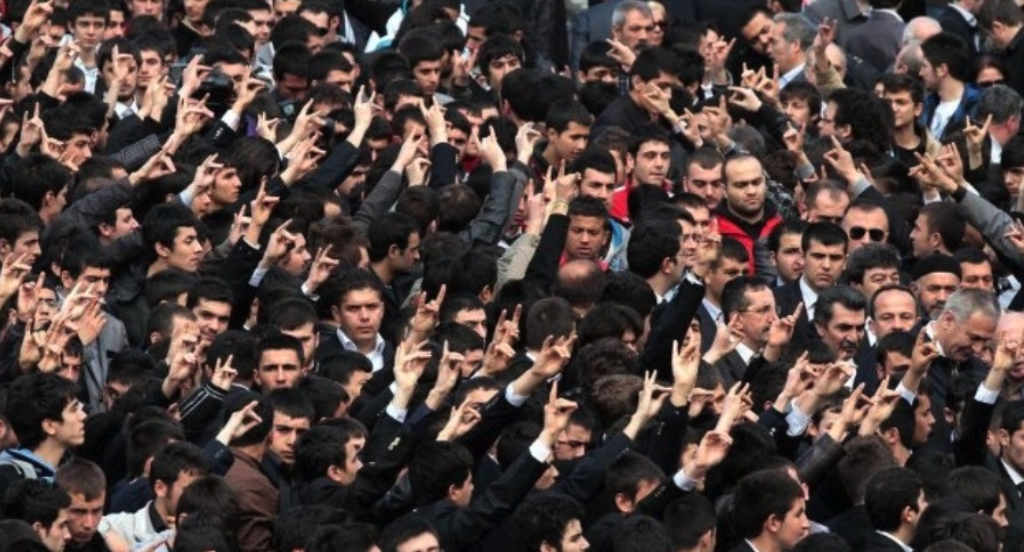In both the pro-government and opposition camps, nationalists are key and rising in popularity. By Abubakr Al-Shamahi in Aljazeera on May 16, 2023.
External analysis of Turkish politics often tends to focus on the divide between political Islamism and secularism, between liberals and conservatives.
But looking at Turkish politics today, there is one ideology that is represented across the board: nationalism.
Nationalists, in the form of the Nationalist Movement Party (MHP) and its leader Devlet Bahceli, are the main allies of Turkish President Recep Tayyip Erdogan.
Former MHP members who split with the party over its support for Erdogan went on to form the Iyi Party in 2017, now a key part of the opposition alliance.
Another ex-MHP member, Sinan Ogan, has been labelled as the “kingmaker” ahead of the presidential run-off scheduled for May 28 after he surprisingly won more than 5 percent in the first round of presidential elections on Sunday.
And then there are nationalists of a different flavour – left-wing Kurdish nationalists of the Peoples’ Democratic Party (HDP), who fought the election under the banner of the Yesil Sol Party.
Even before Ogan’s emergence, the presence of Turkish nationalists at the centre of the two main alliances that fought the elections has allowed the ideology to have a greater effect on both sides of the debate.
It has led to a harder push from both sides to resolve the issue of approximately 3.7 million Syrian refugees living in Turkey — with both Erdogan and his opponent in the presidential run-off, Kemal Kilicdaroglu, tacking to the right on the issue in the past year.
A combination of anti-refugee sentiment and economic hardships has even led to pressure on politicians to send Syrians back to their home country, despite the ongoing rule there of President Bashar al-Assad, and even a spike in violence towards people perceived to be Syrian.
Turkish nationalists have also been able to seize on those same economic problems to foment xenophobic attitudes towards other refugee and migrant populations, and anti-Arab attitudes are also on the rise, both on the left and the right.
Ogan himself has already referenced “terrorism” as a red line for his support in the second round – a clear reference to Kurdish groups. While Erdogan’s AK Party included politicians from the predominantly Kurdish Huda-Par Islamist party in its parliamentary candidate lists, this will be more of a problem for Kilicdaroglu, who received a huge amount of support from HDP voters and will struggle to win over Ogan voters without losing Kurdish support.
Islamic movement replaced by nationalism?
Turkish nationalism has always been present in the post-Ottoman Republic of Turkey but really gained its own distinct path after the emergence of former army colonel Alparslan Turkes in the 1960s.
Turkes founded the MHP, which, along with its paramilitary organisation, the Grey Wolves, fought leftist groups in the 1970s. The Grey Wolves has gone on to be designated a “terrorist” group in Kazakhstan and banned in France, with calls for a “terrorist” designation to also be applied in the wider European Union and the United States. The Turkish government has denied the group’s existence.
While the MHP has moderated under Bahceli, it is still considered to be a hardline nationalist movement, the presence of which has pushed the Turkish government further to the right.
This was not always the case – the MHP opposed Erdogan’s peace process with the Kurdistan Workers’ Party (PKK) in the early 2010s.
But from 2015 onwards, once the peace process broke down, and particularly after the failed coup against Erdogan in 2016, the MHP became a firm ally.
In that sense, the MHP replaced the group that has largely been blamed for the coup, the Gulenists – who were once Erdogan’s close partners.
Bahceli has replaced figures like former president Abdullah Gul and former prime minister Ahmet Davutoglu, men who were pivotal in Erdogan’s rise but who eventually split with him.
Davutoglu himself was famous for his “zero problems with neighbours” foreign policy. The Arab Spring, and a desire to support groups with a background in political Islam, such as Ennahdha in Tunisia and the Muslim Brotherhood in Egypt, ended that.
But the growth in power of the nationalist narrative also contributed to Turkey entrenching itself militarily fighting the PKK and its affiliates in Syria and Iraq, while a desire to project Turkish power has also seen disputes emerge outside of the Middle East, most notably in the eastern Mediterranean.
It all means that while Erdogan’s roots in political Islam can never be discounted and continue to be attractive to domestic conservatives, Turkish nationalism is arguably the stronger ideology within the Turkish government and will continue to be going forward.
What comes next?
Erdogan is now expected to win the run-off against Kilicdaroglu on May 28, having defied the expectations of the pollsters to emerge within a percentage point of winning the presidential election in the first round outright.
But the Turkish leader, who has led the country for 20 years, will turn 70 next year and will be 74 at the time of the next presidential election in 2028. Thoughts will surely be turning to who his successor will be.
It is a big problem for the AK Party, which appears rudderless without Erdogan. While his popularity has generally held steady, the party’s has dipped, shedding voters to nationalist parties.
Within the party, no one has Erdogan’s gravitas or popularity.
Some analysts predict that this means that the path will open for a member of the Republican People’s Party (CHP), perhaps someone like Istanbul’s mayor Ekrem Imamoglu, and that Erdogan’s successor will come from the left.
But it is Turkish nationalism that is on the ascendancy, in both the government and opposition camps, which makes it more likely that successor will emerge from the right.

